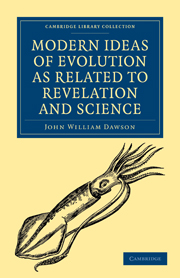Book contents
- Frontmatter
- PREFACE
- Contents
- CHAPTER I PRESENT ASPECTS OF THE QUESTION
- CHAPTER II WHAT IS EVOLUTION?
- CHAPTER III THE ORIGIN OF LIFE
- CHAPTER IV THE APPARITION OF SPECIES IN GEOLOGICAL TIME
- CHAPTER V MONISTIC EVOLUTION
- CHAPTER VI AGNOSTIC EVOLUTION
- CHAPTER VII THEISTIC EVOLUTION
- CHAPTER VIII GOD IN NATURE
- CHAPTER IX MAN IN NATURE
- CHAPTER X GENERAL CONCLUSIONS
- APPENDIX I WEISMANN ON HEREDITY
- APPENDIX II DR. McCOSH ON EVOLUTION
CHAPTER I - PRESENT ASPECTS OF THE QUESTION
Published online by Cambridge University Press: 29 August 2010
- Frontmatter
- PREFACE
- Contents
- CHAPTER I PRESENT ASPECTS OF THE QUESTION
- CHAPTER II WHAT IS EVOLUTION?
- CHAPTER III THE ORIGIN OF LIFE
- CHAPTER IV THE APPARITION OF SPECIES IN GEOLOGICAL TIME
- CHAPTER V MONISTIC EVOLUTION
- CHAPTER VI AGNOSTIC EVOLUTION
- CHAPTER VII THEISTIC EVOLUTION
- CHAPTER VIII GOD IN NATURE
- CHAPTER IX MAN IN NATURE
- CHAPTER X GENERAL CONCLUSIONS
- APPENDIX I WEISMANN ON HEREDITY
- APPENDIX II DR. McCOSH ON EVOLUTION
Summary
The great fabric of the Darwinian evolution may be said to have attained to its completion. Its chief corner-stone has been laid with shouting by its jubilant adherents, and it is presented to us as a permanent and finished structure, fitted to withstand all the attacks of time and chance. We are even asked to regard its architect as the Newton of Natural Science, and to believe in the finality and completeness of the structure which he has raised.
In seeming contrast with this, we find that the disciples of the great teacher are already beginning to diverge widely in their beliefs, and to found new schools, some of which are tending toward the old and discarded theory of Lamarck, or to a modification of it known as Neo-Lamarckianism, while others boast that they maintain the pure Darwinian doctrine though even among these there are diverse shades of belief. Thus, like other hypotheses and philosophical systems which have preceded it, Darwinism seems to have entered on a process of disintegration, and it is not easy to divine in what form or forms it may be handed down to our successors.
While thus liable to different interpretations within itself, the Darwinian evolution has still more varied aspects when we regard it in relation to the other beliefs and interests of humanity. The hypothesis has been applied to all sorts of uses in relation to physical and natural science, as well as to history and sociology and it has been made a means of revolutionising our classifications and our ideas of species and other groups. It is sometimes monistic or positivist, and scarcely distinguishable from the oldfashioned atheism and materialism.
- Type
- Chapter
- Information
- Publisher: Cambridge University PressPrint publication year: 2009First published in: 1890

